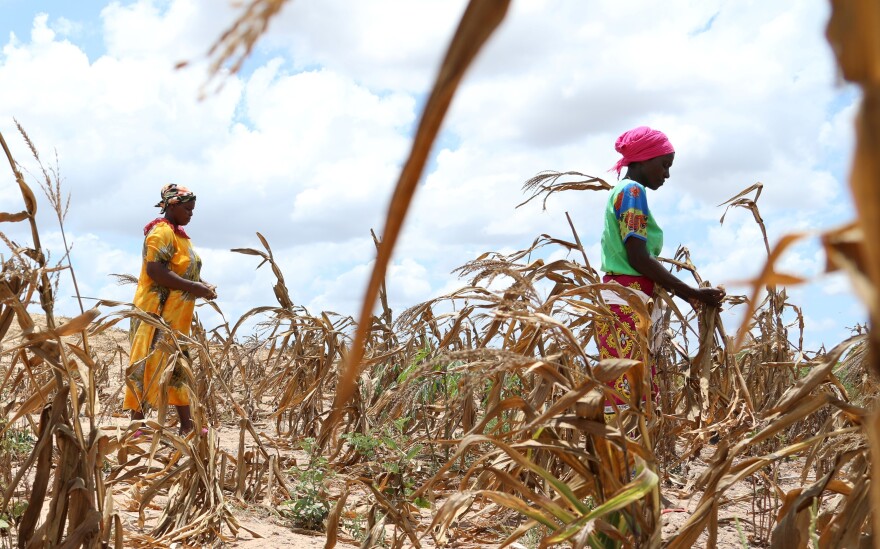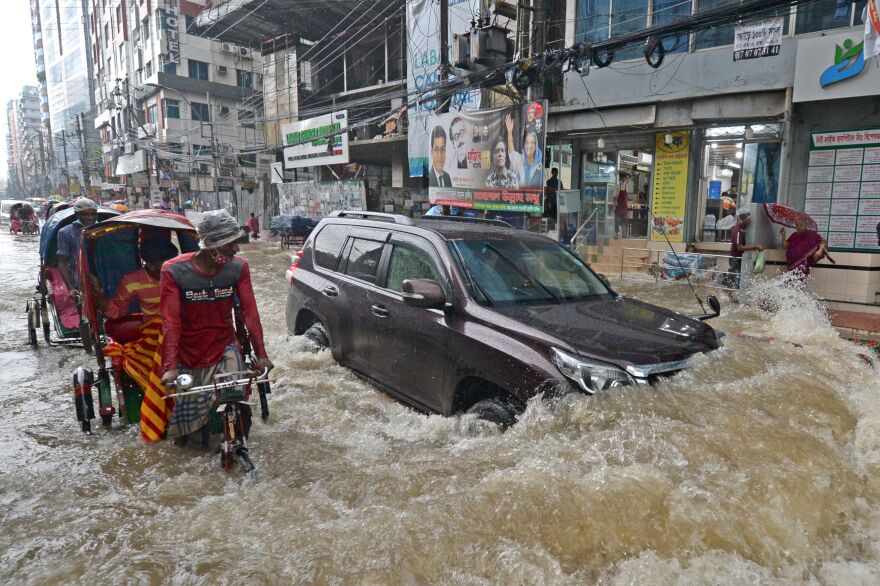The United States owes billions of dollars in climate funding to developing countries. But the war in Ukraine is delaying payments and slowing down U.S. progress to reduce greenhouse gas emissions, and that has leaders in low-lying and less wealthy nations feeling frustrated and forgotten.
"Effectively, the U.S. owes the rest a climate debt that needs to be paid," says Mohamed Adow, the leader of PowerShift Africa, a coalition that advocates for climate policies across the continent. "Our continent is effectively on the front line, and we are paying for the harms [of] these climate pollutants."
In 2021, the U.S. promised to dramatically cut greenhouse gas emissions this decade, and send long-overdue money to help developing countries transition to cleaner energy and protect residents from rising seas, heat waves, food instability and other dangerous climate effects.
If the U.S. follows through, it's still possible to keep global temperatures from rising catastrophically and prevent tens of millions of unnecessary deaths, according to scientists and economists.
But the Russian invasion of Ukraine might put many U.S. promises on hold. Months after renewing its pledges at the international climate conference in Glasgow, the U.S. has not passed any major climate legislation. The Biden administration has rolled back limits on domestic oil and gas drilling to cope with rising energy prices. This spring, Congress allocated less than one third of the international climate funding it pledged, even as it rushed billions of dollars in military assistance to Ukraine.
"It's very disheartening and worrisome," says Alejandra Lopez, a climate policy expert with Transforma, an environmental think tank based in Colombia. "I don't mean to be disrespectful. [The war] is a major crisis," she says. But "even if this [war] is a very scary scenario, climate change continues to be scarier."
The lack of urgent action by the world's wealthiest economy – and the country most culpable for climate change due to historical greenhouse gas emissions – is particularly frustrating for developing countries that are suffering disproportionately from global warming. And where every day of delay puts more people at risk.
By 2030, climate change could push nearly 5.8 million people into extreme poverty in Latin America and the Caribbean, according to the World Bank. The prognosis is even more dire for island nations that are on track to be entirely underwater by midcentury, and for cities in southeast Asia, Africa and the Middle East where heat and rising seas will force millions of people to migrate in order to survive.
"We've already lost so many lives to climate change," says Adow. "Whether it's drought, whether it's flood, whether it's cyclones, our continent has paid a huge price. This is deeply unfair."
The U.S. owes billions of dollars to developing countries
The U.S. owes billions of dollars in climate funding to less wealthy nations. It's not charity, but something akin to reparations. The idea is that countries that industrialized in the early and mid-twentieth century became wealthy in part by burning oil, gas and coal. Climate change driven by emissions from that early industrialization poses the biggest threat to developing countries, which have contributed far less to global warming.
At global climate talks, countries determined some of that wealth must now be used to build a cleaner global economy and protect low-income nations from the effects of a hotter Earth. Under the 2015 Paris agreement, developed nations including the U.S., Canada, Australia, Japan and European countries agreed to pay $100 billion each year to developing countries.
"This is the responsibility of developed countries because their emissions are the primary driver of climate change that the world is experiencing today, a disproportionate burden of which is falling on developing countries," says Rachel Cleetus, an international climate policy expert for the Union of Concerned Scientists, a science advocacy group in the U.S.
But that $100 billion has never fully materialized. In 2018, the most recent year for which there is complete data, contributions were slightly less than $80 billion, in part because the U.S. contributed so little.
Under the Obama administration, the U.S. delivered just $1 billion, which was about one third of what it pledged under the Paris climate agreement. Then, the Trump administration canceled U.S. membership in the agreement altogether.
The Biden administration said it would make good on past promises by contributing more than $11 billion per year to developing countries by 2024. The first step toward that goal came last fall, when the U.S. announced it would send $3.1 billion to climate-vulnerable developing nations.
Then, in March, Congress allocated just $1 billion in international climate funding.
"When Biden came into office, he was a huge source of hope," says Adow of PowerShift Africa. "I would say some of that hope was misplaced. He's talked a good game, but he hasn't had much of substance. And now we see billions being pumped into the war in Ukraine."
In March, the U.S. sent more than $13 billion to Ukraine, and an additional $40 billion in support is making its way through Congress.
A spokesperson for the State Department tells NPR that U.S. international climate funding fell short this year, but that the U.S. is nonetheless committed to increasing its climate support for developing countries.
The Russian invasion is influencing U.S. climate policy in multiple ways
There are many ways that the war in Ukraine is delaying U.S. climate action, according to climate economists. The Russian invasion is contributing to global economic inflation, which feeds opposition to major infrastructure legislation stuck in Congress. That legislation would help the U.S. meet its emissions goals by investing in electric vehicles, solar and wind electricity and energy-efficient buildings.
Higher gasoline prices also led the Biden administration to encourage U.S. fossil fuel companies to produce more oil and gas.
And then there's the problem of mental bandwidth. "The biggest risk for U.S. climate action is just a lack of focus and attention," says Trevor Houser, a climate analyst at the think tank Rhodium Group in the U.S. "Policymakers in any country have limited attention, and the war in Ukraine is a giant crisis that requires a lot of focus and attention."
Houser says the money going to Ukraine is not being directly taken away from climate initiatives. But the focus on the war and its effects is distracting U.S. policymakers from the urgent work of reducing emissions and adapting to climate change around the world.
"One of the big challenges of climate is that [climate change] is always seen by policymakers as tomorrow's issue," Houser says. "It's always the issue you can come back to later."
This week, United Nations Climate Envoy Mark Carney warned that the war in Ukraine should not delay action to rein in global warming, and cited the worsening effects of climate change on people living in developing countries.
This is a pivotal moment for climate investment
Developing countries feel the impacts of the missing money acutely, because climate change is causing more severe floods, cyclones, droughts, wildfires and heat waves around the world.

Recent disasters have underscored the human cost. In April, hundreds of people died in climate-driven heat waves in India and Pakistan and floods in South Africa. Relentless heat and drought in the Middle East and central Africa are causing crop damage and famine. And countries across Latin America are bracing for another destructive hurricane season without adequate infrastructure to protect people in coastal areas.
Projects are underway to protect people in the U.S. from such hazards. For example, public funding is paying to reinforce coastal cities to manage flooding, upgrade early warning systems for hurricanes, build cooling centers to protect people on hot days, help people rebuild homes destroyed in wildfires and pay farmers when crops fail due to drought.
But in developing countries, many such projects are waiting for funding. For example, Lopez says, in Latin America there is an enormous need for public health infrastructure to deal with diseases that will be more prevalent as the Earth warms. Countries also need physical infrastructure to protect people from hurricanes and decrease urban emissions from cars and trucks.
Such projects require public funding, however. And many developing countries lack the domestic tax revenues to finance these changes and protections on their own. "They already know how to do it, but they don't have money to invest," says Lopez.
Such investment can also help reduce global greenhouse gas emissions. Many developing countries have both plentiful renewable energy and undeveloped oil and gas. If humans hope to keep global temperatures from rising above the critical 1.5 degree Celsius (2.7 degree Fahrenheit) threshold set by scientists, countries must stop investing in further fossil fuel development, according to the International Energy Agency.
"This continent is incredibly blessed with renewable energy," says Adow, referring to Africa's largely undeveloped wind, solar and geothermal resources. If more funding was available to kickstart clean technology projects across Africa, it would help address both the causes of climate change and its effects, according to a recent report by the United Nations.
"We will effectively be powering this continent and lifting people out of poverty without increasing emissions," he says. "We just need the investment."
Copyright 2022 NPR. To see more, visit https://www.npr.org.



